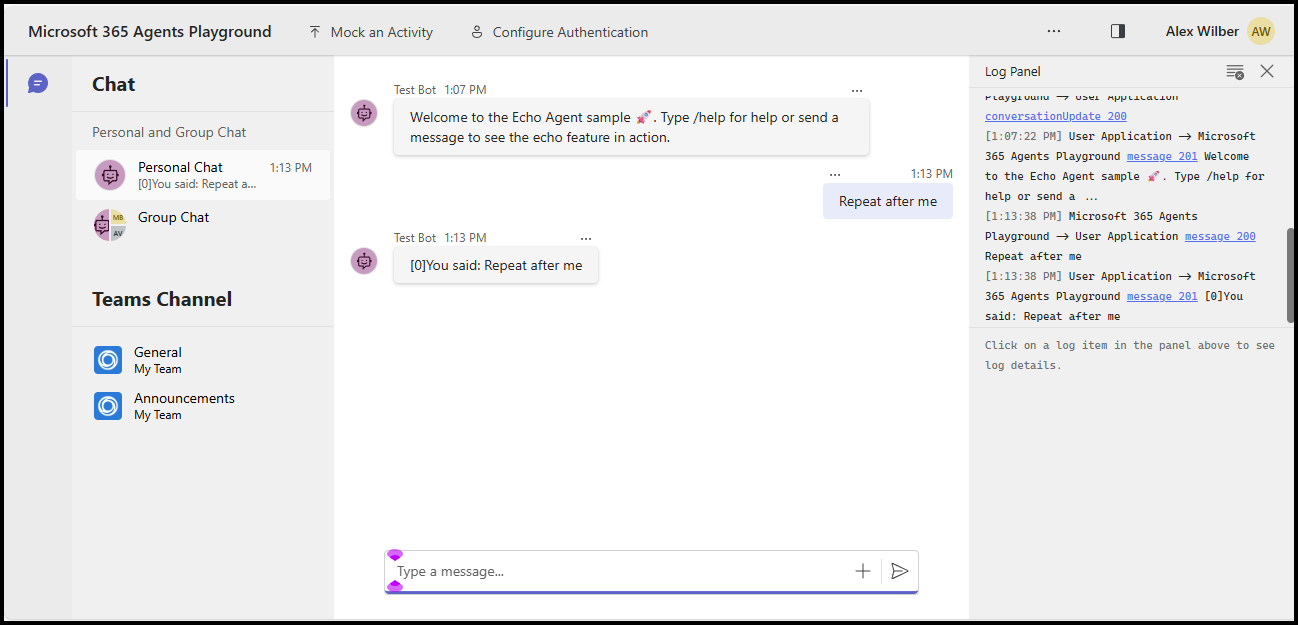Note
Access to this page requires authorization. You can try signing in or changing directories.
Access to this page requires authorization. You can try changing directories.
This quickstart guides you through creating a custom engine agent that just replies with whatever you send to it.
Prerequisites
Node.js v22 or newer
- To install Node.js go to nodejs.org, and follow the instructions for your operating system.
- To verify the version, in a terminal window type
node --version.
A code editor of your choice. These instructions use Visual Studio Code.
Initialize the project and install the SDK
Use npm to initialize a node.js project by creating a package.json and installing the required dependencies
Open a terminal and create a new folder
mkdir echo cd echoInitialize the node.js project
npm init -yInstall the Agents SDK
npm install @microsoft/agents-hosting-expressOpen the folder using Visual Studio Code using the this command:
code .
Import the required libraries
Create the file index.mjs and import the following NPM packages into your application code:
// index.mjs
import { startServer } from '@microsoft/agents-hosting-express'
import { AgentApplication, MemoryStorage } from '@microsoft/agents-hosting'
Implement the EchoAgent as an AgentApplication
In index.mjs, add the following code to create the EchoAgent extending the AgentApplication, and implement three routes to respond to three events:
- Conversation Update
- the message
/help - any other activity
class EchoAgent extends AgentApplication {
constructor (storage) {
super({ storage })
this.onConversationUpdate('membersAdded', this._help)
this.onMessage('/help', this._help)
this.onActivity('message', this._echo)
}
_help = async context =>
await context.sendActivity(`Welcome to the Echo Agent sample 🚀.
Type /help for help or send a message to see the echo feature in action.`)
_echo = async (context, state) => {
let counter= state.getValue('conversation.counter') || 0
await context.sendActivity(`[${counter++}]You said: ${context.activity.text}`)
state.setValue('conversation.counter', counter)
}
}
Start the web server to listen in localhost:3978
At the end of index.mjs start the web server using startServer based on express using MemoryStorage as the turn state storage.
startServer(new EchoAgent(new MemoryStorage()))
Run the Agent locally in anonymous mode
From your terminal, run this command:
node index.mjs
The terminal should return this:
Server listening to port 3978 on sdk 0.6.18 for appId undefined debug undefined
Test the agent locally
From another terminal (to keep the agent running) install the Microsoft 365 Agents Playground with this command:
npm install -D @microsoft/teams-app-test-toolThe terminal should return something like:
added 1 package, and audited 130 packages in 1s 19 packages are looking for funding run `npm fund` for details found 0 vulnerabilitiesRun the test tool to interact with your agent using this command:
node_modules/.bin/teamsapptesterThe terminal should return something like:
Telemetry: agents-playground-cli/serverStart {"cleanProperties":{"options":"{\"configFileOptions\":{\"path\":\"<REDACTED: user-file-path>\"},\"appConfig\":{},\"port\":56150,\"disableTelemetry\":false}"}} Telemetry: agents-playground-cli/cliStart {"cleanProperties":{"isExec":"false","argv":"<REDACTED: user-file-path>,<REDACTED: user-file-path>"}} Listening on 56150 Microsoft 365 Agents Playground is being launched for you to debug the app: http://localhost:56150 started web socket client started web socket client Waiting for connection of endpoint: http://127.0.0.1:3978/api/messages waiting for 1 resources: http://127.0.0.1:3978/api/messages wait-on(37568) complete Telemetry: agents-playground-server/getConfig {"cleanProperties":{"internalConfig":"{\"locale\":\"en-US\",\"localTimezone\":\"America/Los_Angeles\",\"channelId\":\"msteams\"}"}} Telemetry: agents-playground-server/sendActivity {"cleanProperties":{"activityType":"installationUpdate","conversationId":"5305bb42-59c9-4a4c-a2b6-e7a8f4162ede","headers":"{\"x-ms-agents-playground\":\"true\"}"}} Telemetry: agents-playground-server/sendActivity {"cleanProperties":{"activityType":"conversationUpdate","conversationId":"5305bb42-59c9-4a4c-a2b6-e7a8f4162ede","headers":"{\"x-ms-agents-playground\":\"true\"}"}}
The teamsapptester command opens your default browser and connects to your agent.

Now you can send any message to see the echo reply, or send the message /help to see how that message is routed to the _help handler.